#metafictions
Text
Tim: So, and for what reason was I 17 years old for the last 15 years?
Damian: That's what you're complaining about? They couldn't even bother to give me a proper characterization until much later on. And then it is one that does not align with my upbringing!
Stephanie: At least you weren't killed just because of misogyny
Dick: Yeah, I wonder how anyone let that through. But then again, I shouldn't expect anything else from writers who made me stuck as Ric for two years and all the, you know, Tarantula stuff
Jason: It's honestly like they just spin a wheel every day to figure out if I'm a villain, hero or anti-hero
Duke: Forget about the writers, the fans also have some... wild assumptions
Stephanie: Yeah, like that you're the normal one!
Cass: Or that I'm mute. Just there to give emotional support
Barbara: Or that the most traumatic thing to ever happen to me is framed as something good just because I became Oracle. I barely had one page of dialogue in that entire story!
Tim: At least they get one thing right.
Dick: And that is?
Tim: Bruce.
Jason: Yeah, what is up with that?! It feels like I've become his punching bag! Why is he considered a hero again when he is just plain abusive at this point?
Duke: Patriarchy
Barbara: And male power fantasy
#meta#dc#dc comics#batman#batman comics#metafiction#tim drake#jason todd#dick grayson#damian wayne#damian al ghul#I could have talked more about other issues but if I'd do that I'd be sitting here until tomorrow#cassandra cain#stephanie brown#duke thomas#barbara gordon#robin#red robin#nightwing#dc signal#dc orphan#batgirl#dc spoiler#dc oracle#red hood#bruce wayne#batkids#batsiblings#batfam#batfamily
2K notes
·
View notes
Text
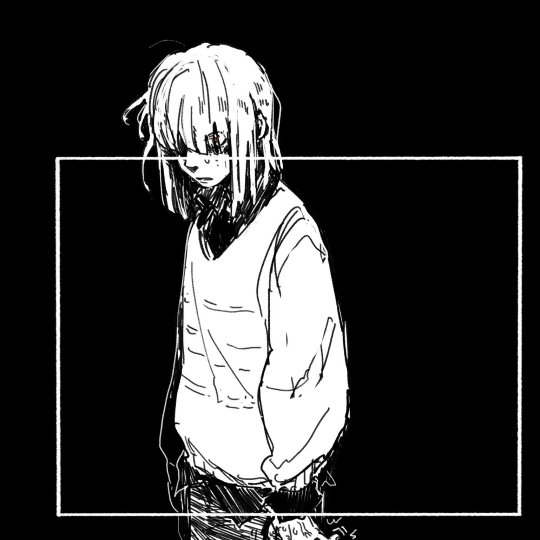

Ghost haunting the house of your own body
#deltarune#kris dreemurr#deltarune susie#deltarune noelle#deltarune kris#myart#i love metafiction linked with the concept of free will
3K notes
·
View notes
Text

🫣 It’s here
#good omens#aziracrow#ineffable husbands#reblogs are so appreciated love u 🙏❤️#good omens fanfiction#good omens fic#aziraphale’s diaries#metafiction
860 notes
·
View notes
Text
the lords in black are so interesting to me because. they’re so us. we’re watching the citizens of hatchetfield suffer for our own entertainment just as much as they are. we’re their accomplices in all of it
pokotho made hatchetfield into a musical because musicals are entertaining. and we ate that shit up! it’s soooo fun watching a little man scramble as the world around him bursts into song. the musical genre is satirized because pokey knows how the genre conventions work just as well as we do. we like watching musicals so much that black friday and npmd are musicals, too, even though they don’t revolve around pokotho’s plans as much as tgwdlm. we want them to sing. pokotho does too.
bliklotep is the audience and the audience is bliklotep. trail to oregon calls the audience “the watcher with one thousand eyes” and that’s not all, in watcher world blinky seems to be able to see through the eyes of anyone and everyone who loves spectacle. he wants to see the characters go through angst because WE love angst. it’s fun to watch alice and bill express their buried frustrations. blinky wants it to end in bloodshed because he loves tragedy, and let’s face it, so do we. it’s like that one post about how hamlet is aware of the audience and is angry that we don’t do anything to intervene because we want to see how it plays out. personally, I think blinky could have stopped the woodwards if he really wanted (he’s an elder god, after all) but alice shooting him shifted the narrative so that the emotional payoff would be more fulfilling if they escaped. and blinky loves a good story.
t’noy karaxis has blorbos. we joke about it, but that’s really what it is, isn’t it? he’s the fan who watches the movie again and again and again and again to see his favorite character’s dramatic death scene. he’s the guy who writes and reads angst fics by the hundreds because he likes to see his faves cry. he’s the hatchetfield enjoyer who’s on the edge of their seat waiting to see how ted kicks the bucket this time. the bastard’s box is pretty much just an ao3 account filled with whump and hurt no comfort. he’s sadistic AND he genuinely adores ted, because we fans are often cruelest to the characters we love the most. he puts ted through character growth— the realization that his life went the way it did because of his own mistakes, his inability to be vulnerable with jenny before it was too late— and he does that by writing a 56-chapter angst fic that’s still updating to this day
nibblenephim is the fan who voraciously devours every scrap of content that a creator produces and demands more, more, more. let’s face it, the fandom will never let starkid rest until we see this story through to its end. and then someone will demand a sequel series. nibbly is hungry because we will never stop yearning for more stories. he’s simple because that desire itself is simple— as humans, we need creativity like we need air to breathe. nibbly wants more because we want more. and we will never be satiated.
wiggog y’rath is the ruler and the king because he’s the self-inserting writer. I think jon matteson plays paul *and* wiggly for a reason— wiggly is the only lord in black to be played by the same actor in every single show, and that actor also plays the protagonist of tgwdlm. wiggly wants to be the protagonist. he tries to force himself into the human world of hatchetfield because he wants to participate, dammit! he wants to be the bestest ruler that the earth has ever seen! everyone has to love him because he’s going to be their bestest fwiend! when he appears in human form he’s gonna be the prom king! he’s the ebony dark’ness dementia raven way of the hatchetfield multiverse. he wants every human character to bend to his whims and to love him and to put him at the tippy-top of planet earth because he’s the writer and the writer’s main character, you fuckheads, and he can make whatever story he wants, whether the other characters like it or not! if you’ve ever written a self-insert story? congratulations! you’ve been wiggog y’rath.
and the funny thing? I don’t think the lords know that they, too, are as fictional as anyone else in hatchetfield. maybe blinky knows— he sees through the audience’s eyes, after all— but I don’t think the others do. if they did, maybe they’d be a little less tyrannical. a little bit nicer.
but then the starkid writers wouldn’t have much of a story to tell, would they?
#the lords in black#starkid#hatchetfield#hatchetverse#npmd#join me in the metafiction analysis hole.#the real villains of hatchetfield are the starkid writers themselves and those of us who want to see the shows!#the only reason the lords in black fuck up the world is because WE want to see that story!!!!!#note: the ‘you fuckheads’ bit was meant to be in wiggly’s voice/pov. I do not think the good people of starkid fandom are fuckheads.
571 notes
·
View notes
Text
5 Good Omens Timefucks that Haunt Me
1.
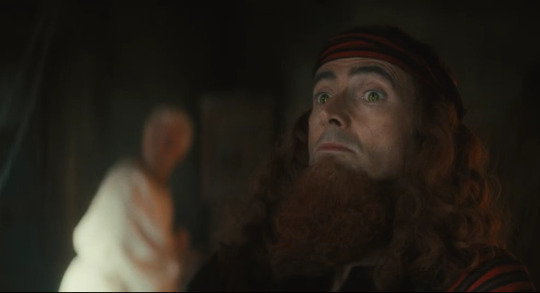
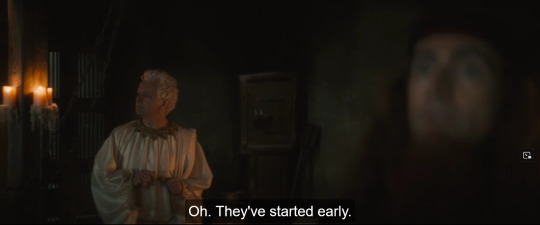
Why is this here? Why is this line included? Is it just to add texture, to imply that larger world of corporate fascism of which Crowley and Aziraphale are subjects and victims and little worker bees? If so, why "They've started early" specifically? Why not "I wouldn't have expected that shrub to be the first to go" or "Aw, I liked that rock formation"?
Crawly doesn't make this comment in an offhand way: he sounds a bit taken aback and not thrilled that things have kicked off sooner than he anticipated. But it doesn't ultimately seem to make any difference to this scene, so why do we, the audience, need to know Hell started early?
2.


This one I'm not as confident will turn out to be significant, because iirc it appears in the book, which was a complete story when written, and because it serves a narrative purpose: it puts Agnes Nutter in charge of the situation, not her murderers. By backfooting Witchfinder Major Pulsifer, Agnes startles him enough she's able to walk past him without Pulsifer seizing her and discovering the extra 80 lbs of gunpowder and roofing nails in her skirts.
But. Agnes Nutter's sense of time is Nice and Accurate, and she notices the witchburning party are late and remarks on it to herself before she says anything to Pulsifer. So assuming a few minutes to position Agnes, tie her to the stake, and read the charges and conviction against her, Pulsifer and Agnes' neighbors are 12-15 minutes later than they should be. Why?
If the book answers this question, I don't recall; the show does not. And again, it seems to make no ultimate difference to this scene.
I'm not saying this was even purposely included in S1 as a timefuck. I am suggesting that as Gaiman seems to be fucking with time or timelines in this story, even if he and Pratchett didn't plan it like this when discussing the sequel, a retcon is hardly out of the question.
3.
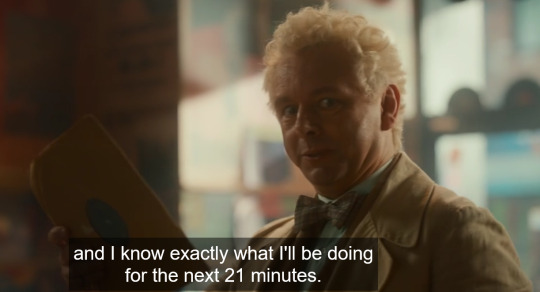
As others have pointed out, Shostakovich's Symphony No. 5 is 45-55 minutes long. If you're listening to it on 78s instead of LPs because you are a CRAZY PERSON, it's going to take you more like 1 hour 5 minutes, because one side of a 78 holds, at most, 5 minutes of music, so every 5 minutes you have to get up and flip or switch the record.
Shostakovich wrote his 5th symphony in response to criticism in the state newspaper (possibly penned by Stalin himself) that his previous work didn't suck the Communist Party's dick hard enough--the kind of criticism that put him in danger of being sent to prison or killed. At the time it was first performed in 1937, Symphony No. 5 was considered a massive triumph, walking the line perfectly between Shostakovich's artistic standards and the Communist Party's demands of him.
The choice is symbolically significant, but it's a symphony, so whoever's censoring it isn't censoring lyrics or information. Again, why? Why is a 45-55-minute symphony only 21 minutes long? What did the time thief do with the 24-34 minutes?
4.
Here's the rug that covers the portal to Heaven in Episode 1:

Here's the rug in Ep. 2:
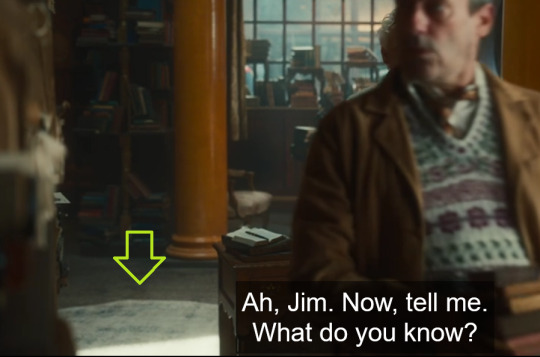
Aziraphale does not change this rug for the party. We know this bc we see it in Episode 5 when Mrs Sandwich enters the bookshop and the party is in full swing:

Now here's Aziraphale moving the circular rug to expose the portal to Heaven:
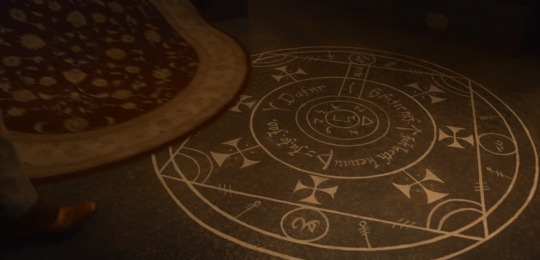
But here's Crowley, putting the rug back:

Why are there two different rugs?
5.
Every end credits track has the first line of "Everyday" embedded in it But after the line from "Everyday," at the end of Episode 4, the theme skips twice like a vinyl record, and then is stopped by whoever controls the turntable and restarted, with several seconds of music having been skipped over.
This is not the first time it has mattered to a character in Good Omens what we in the audience see and hear. I argue here that God asks Aziraphale what he did with the flaming sword She gave him in order to show us the audience who Aziraphale is. God also addresses us the audience directly in S1, not only narrating about characters omnisciently but speaking to us about Herself in first person.
Now we evidently have a second character who has gone meta and is changing what we the audience experience of this story, and--indications are good--the story itself.
#good omens#good omens s2#good omens meta#good omens timefucks#good omens chronology#good omens discontinuity#good omens as metafiction
659 notes
·
View notes
Text
BURY YOUR GAYS has a whole dang bunch of 'media within media' meaning movies or television that only exists in a fictional timeline. so i have been thinking, what is your favorite metafiction way?
personally chuck has been watching sopranos and i really want to see CLEAVER
also preorder BURY YOUR GAYS for the the scoop on 'devil's due' and 'broken don'
297 notes
·
View notes
Note
what's the strange aeons opinion you disagree with?
(just to clarify: this was a lighthearted jab, i dont really care and this explanation is just for posterity. except for the clown thing. fix that)
There was a recent strange aeons video that reiterated what I see as kind of poor tumblr takes on Steven Moffat's work, specifically that he 1) only writes cheap shock value without meaningful stories to make himself look clever, 2) that his work is "for men like him, who wanted to watch strong male characters who are always right save the day and ogle at some hot women along the way", and 3) that he habitually queerbaited because he didn't know how to respond to a female fanbase (1)
I talked a bit why I disagree with this here; basically, I just think it was one of those things where a subset of a fandom would interpret the work as being deliberately vindictive (Ex. "We have issues with this show, so it must be because the writer is making it bad on purpose to spite us. Only a very arrogant person would do that, so it is now reasonable to see everything in this show through the lens of that ego." etc etc), and it got to the point where the actual themes and motifs of the shows would be entirely unremarked upon or outright dismissed (and it was even a bit of a tumblr faux pas to attempt to engage with them at all) in favor of trying to dissect how and why each episode and character was bad/hostile towards the audience.
Because these takes were so popular and widely accepted then, they're often treated as the most objective and nuanced take now.
I could get into why I disagree further in regards to the actual content of the shows, but to put it simply, I just think he's a good writer who did some really thoughtful and thematically engaging work for reasons other than, you know, trying to make himself look smart and not wanting girls to watch doctor who.
(1) (I didn't really go into this in that previous post but I think it's really weird how people treat the co showrunner, Mark Gatiss, a gay man who wrote a lot of what people attribute to Moffat as a straight man queerbaiting female fans, as a non entity in this conversation. I'm not a big fan of Gatiss but, like, I don't know, give him some agency in his own art here)
#i'm explaining because people keep asking and I deleted my last post#i don't think it helped that steven moffat's work tends to be very metafictional/thematically driven#and therefore easy to dismiss as nonsense if you're already not willing to engage with it at all
103 notes
·
View notes
Text
you ever stop and remember Edel in Princess Tutu saying, "May those who accept their fate be granted Happiness; may those who defy their fate be granted Glory," and go a little insane?
#princess tutu#my dash hit me with some Web talk from TMA and hemidemi mentioned the metafictional nature of the Web#and now it's all I can think of and I'm mcfreakin' losing it all over again
115 notes
·
View notes
Text



been working on some zines 👀
#this one is by lu and piper#zines#sherlock holmes#acd holmes#sidney paget#john watson#sherlock holmes x john watson#johnlock#queer zine#queer lit#metafiction#or else mystery
78 notes
·
View notes
Text
[…]
[…!]
⮚ IT'S CHRISTMAS!!!!!!! ⮘
⮚ @pheriya! @hashbang-mods! come over, quickly!
@fictitiousfanfics, @hashbang-mods, @ken-primordial-janitor! wake up!! ⮘
Huh? what…
⮚ you too, Kschwal! it's our first Christmas, we have to get everyone here!
#epprbcu#By ðe way: if you're looking to reblog ðis check if someone already reblogged it!#(and if ðey're in ðe same metafiction layer)
238 notes
·
View notes
Text

Still can't find a working link for Goncharov (1973), but...
Creating Goncharov is live on Itch.io!

Everyone knows Goncharov. Martin Scorsese's 1973 film is a cult classic, a true masterpiece of cinema. To celebrate its upcoming 50th anniversary, you, an office drone working at a major media corporation, have to create a pitch for a 2023 remake. It's an amazing opportunity that could launch your career. There's just one problem.
You haven't seen Goncharov.
Unable to turn down your corporate overlords, you and an indecisive colleague throw together a story based solely on information you can quickly find or invent.
How will you reimagine the greatest mafia movie ever made and what will you do to turn your ideas into reality?

Creating Goncharov is a surreal interactive fiction game created for Autumn Chen's Goncharov game jam. This game was written and coded by Albie. For more games by Albie, click here.
Play it here!
CW: Unreality and brief descriptions of smoking, violence, and death
Featuring the song "Main Theme from Goncharov" by @caramiaaddio. Original poster by @beelzeebub. Game screenshots below the cut.
Check out the other games made for the game jam here.

Goncharov is a fake film. Read more on it here.




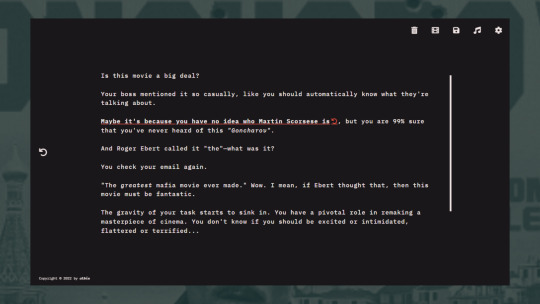

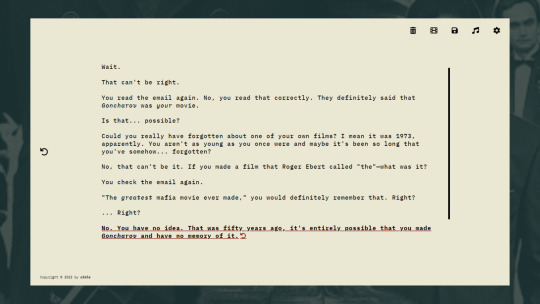

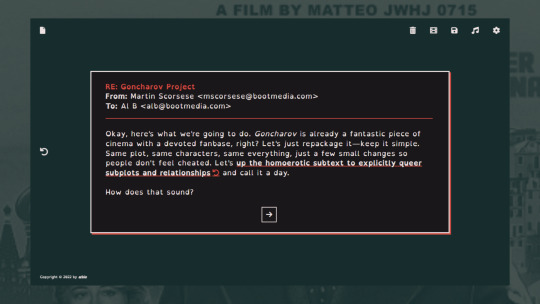

#goncharov#martin scorsese#interactive fiction#surreal#lgbtq#fanfic#indie game#game dev#goncharov 1973#twine game#game jam#comedy#goncharov game#metafiction#goncharov meta#creating goncharov#unreality#cw unreality
1K notes
·
View notes
Text
Worm and other media that won't just let you shoot the Joker, part 1:
Worm comments on the structure of stories, especially superhero stories, in some interesting ways. There's a lot of stuff that happen in superhero comics for no real reason than that it needs to happen for the story to be interesting; a huge amount of Worm's worldbuilding is devoted to taking these things and making the fact that they have to happen an explicit in-setting constraint. For instance, superhero stories tend to have more powerful heroes face off against much more powerful villains than their less-powerful allies, to the point where it seems like super-powerful threats are coming to earth every few weeks just because it wouldn't be interesting to read that comic otherwise. It gets weirder when you compare what villains end up visiting the cities of uber-powerful heroes vs the cities of less powerful heroes: Gotham mostly just has to deal with serial killers while Metropolis is a magnet for evil gods. Worm plays with this by having the Endbringers exist only because the big hero needed something to fight in-text: it changes "powerful heroes need powerful villains or else it wouldn't be interesting" from a Doylist justification to a Watsonian one. Then there's the fact that so much of the horrible conflict in Earth Bet is explicitly caused by Gods making sure the powers they grant people lead to increased conflict, the fact that one of the most powerful characters does what she does because the plot path to victory says she needs to, etc.
But the big one is Jack Slash, and how he's only able to get away with his bullshit because he has plot armor as a secondary power. As WB says here, "Jack's a reconstruction of the Joker type character in the sense that you can't have such a character take such a high profile position in the setting, without having there be a cheat." The Joker and similar characters are only able to keep being relevant threats in their stories because the narrative bends to let them win and stops them from being killed. Jack Slash is only able to keep being a relevant threat because his power makes the universe bend to let him win in the same way. Not only does this make for an interesting obstacle (its almost like they're fighting an authorial mandate!), but it skewers the use of similar character's plot armor and how unrealistic and unsatisfying it makes their stories.
But wait, what does it mean for a story to be "unrealistic" in the context of superpowers? Is being unrealistic in those contexts actually a problem? For that matter, what does it mean for a narrative to bend to let someone win? Its not like there's an objective way fighting the Joker would go, which the author is deviating from by letting him survive.
[Stuff under readbelow contains spoilers fo, the movie Funny Games and the book Anybody Home?]
Maybe we could say that if characters like the Joker were real, and put in the situations they are in their stories, they would end up being killed really quickly. But is that a reasonable way to judge stories? A narrative where such a character is killed unceremoniously to satisfy a need for realism isn't any less an expression of the author's deliberate choices than a story where the character keeps showing back up to satisfy a desire for fan-favorite characters. And while Jack Slash's arcs help show why deviating from "realistic consequences" in the service of keeping a character alive can make a story exhausting and screw with an audiences' appreciation of stakes, it doesn't make a strong case against the concept of villains having plot armor in general. A story isn't necessarily worse just for being constructed to keep the villains alive—all stories are constructed, and sometimes being constructed that way makes for the best story.
That becomes more clear when you take the premise of Jack Slash as "killer who wins because the mechanics of the universe says so" and make clear just how much "the mechanics of the universe" really just means "the story". Which is how you get Peter and Paul from Funny Games.
I'd highly recommend watching Funny Games (though for the love of god check content warnings), as well as Patricia Taxxon's review of it that I'm cribbing a lot from here. But to summarize, Funny Games is a movie written and directed by Michael Haneke about a family's lakeside vacation being interrupted by the appearance of two murderous young men, who capture them in their own house and slowly torture and kill them off. At least, that's what it seems to be about initially. It marketed itself as a somewhat standard entry in the genres of torture porn and home invasion thrillers, and played itself straight as one for the majority of its runtime. But then one of the two villains of the pair, "Paul," starts talking to the audience.
It starts small: after crippling the family's father and revealing that he killed their dog, Paul has the wife look for its corpse outside. While giving her hints, he slowly turns back towards the camera and smirks, before turning back. In isolation, maybe it could be interpreted as Paul smirking at Peter, seeming to look out at the audience only because of clumsy blocking. But then it happens again. Paul tells the family, who are completely at their mercy at this point, that they're gonna bet that they'll all be dead within twelve hours. When the family refuses to take the bet, asking how they could hope to win it when he can clearly off them all whenever they wish, Paul turns towards the audience and asks "what do you think? Do you think they stand a chance? Well you're on their side aren't you. Who you betting on, eh?" The audience is being acknowledged; their role as someone invested in the story is being examined by the ones introducing the stakes.
youtube
But the biggest moment comes near the end, when the mother grabs the shotgun she's being threatened with and blasts Peter. Paul startles, grins, and then hurredly grabs a tv remote and presses rewind. The movie itself suddenly rewinds to right before the mother grabs the gun, and plays again with Paul grabbing the shotgun right before the mother reaches for it.
Its a truly incredible moment, in that its the perfect way to forcibly take away the audience's suspension of disbelief. It forces the audience to acknowledge that they're viewing a story, not something happening to a real family. After their moment of catharsis against the villains, Paul makes the confront the fact that the movie will end however the creators want it to, and if they want the villains to win they'll will regardless of how little sense it makes. Fuck you, we can go from being set in the normal world with normal rules to the villains traveling back in time with a tv remote, because a story does whatever its creators want. Haneke just decided to make that obvious in the most jarring way imaginable.
But maybe the best way to illustrate Funny Games effectiveness at this type of artful unveiling is comparing it to its less-effective imitators. I've recently finished Anybody Home?, a recently-published book by Michael J. Seidlinger. It has the conceit of being narrated by an unnamed mass-murderer, guiding a new killer in their first home invasion. I started reading it before I watched Funny Games, and even afterwards took a while to realize the unnamed narrator wasn’t just a pastiche of a Paul-like character but was actually supposed to be read as Paul himself. Seidlinger was having his book be a sort of unofficial sequel to Funny Games, narrated by its star. Once I realized, a lot of the books details suddenly clicked. The big one was the constant references to “the camera" and the idea of murder being a performance for an audience, one that needed to be fresh and original to make “the cults” enjoy it. Take these passages from page 77:
If it happened, it would perturb. It would create suspicion. It wouldn’t end up ruining the performance, and yet, it could have derailed our casing. The camera can have all it wants; either way, it’ll make it look better than it really was. It’ll strip away the cues and other planned orchestrations and it’ll show the action—the actuality of each scene, each suggestion…
This is a spectacle, above all. The craft pertains to keeping and maintaining a captive audience; behind the camera, you’ll never know how it happened—the trickery that made the impossible possible, the insanity so close to home. It is spectacle.
Through online activity, the son made it clear that something is happening at home, yet we cannot be certain if he has noticed the camera.
These all point to the idea that the murders are being viewed by an audience rather than just by intruders, that this is a performance for said audience's benefit more than anything else. But notably, it also reinforces the idea of these characters having an existence outside of the camera: the camera shows the action and "strips away" the cues behind it, the victims have a life outside the camera such that they could plausibly sense that the camera is now here. The victims are sometimes described as playing into their role, but always metaphorically; always as if normal people start acting like characters when put in certain circumstances. Whereas Funny Games posits that characters will behave however the author wants them to, denying the claim that stories are realistic simulations of hypothetical scenarios.
The whole thing is predicated on the idea that there needs to be a guide, that the villain of a home invader movie is really in danger of something going wrong. Paul/The narrator keeps giving directions on what needs to be double checked, what needs to X, and its completely against the spirit of the role Paul served in Funny Games. If something goes wrong for the villain they should just be able to rewind and do it over, because the story was written for them to succeed. Anybody Home? throws out Funny Games theme of the story being on rails, of the winner being whoever the author wants it to be and the events following whatever the author wanted rather than what would "really" happen. It throws out the whole idea that it’s all just a story, by supporting the idea that the characters have lives not captured by the camera—or more relevantly, not captured on-page.
Because Seidlinger using the language of film in a book leads to different things going on with the fourth wall. The way Funny Games and Anybody Home? make the camera explicit are just different, and the former does it much more interestingly than the latter. Seildinger’s characters aren’t looking back at the reader, the fourth wall is never actually breached. Funny Games has Paul look into the camera to address the audience, making clear how it’s a story being set up for the audience's benefit. Anybody Home? invokes the idea of a camera tracking everything home invaders do in general, having it be a third-party force that’s itself an unseen character contained within the story, observing the intruder's crime rather than the reader. Why is it still a camera, if we're in a book rather than a movie? A character in a book talking about a camera watching them does not convey any of the same meaning as a character in a movie suddenly looking into a camera and smirking at the audience!
By the end, you realize that this is caused in part by the book's bizarro take on how horror movies exist in this world. It reveals that in its setting, all horror movies are adaptations of real home invasions, which get recorded by unseen mysterious forces. Killers enter a home and enact violence, are filmed by some supernatural camera, the footage gets leaked to the public, and then the killers sell the rights to the work to studios. The events of SAW really happened, but the movie was just an adaptation. Funny Games really happened, but the Paul in the movies was just an actor playing the Paul narrating this book. The killer's victims eventually realize that they're "victims," but not in the sense that they realize their characters in a story, only in a sense that they realize they got sucked into their world's magical realism bullshit.
Ultimately, while the book does the same trick of being all about how horror stories are “for” us, it gets rid of all the tricks that made it work for Funny Games. It even strips it's in-universe version of what made it special; Funny Games is just another adaptation of a real home invasion. All the meta stuff that makes it interesting in its genre are just gestured at as aesthetics.
So what makes Jack Slash in Worm succeed where the killers in Anybody Home? fail? Both are constructed to be entertaining for a 3rd party who stand-in for but aren't actually the audience; the entities in Worm, the cults in Anybody Home?. But Jack Slash doesn't mix his metaphors. Worm may turn various real-life factors affecting a work into in-story mechanisms of the world in the same way Anybody Home? does. But it doesn't also base itself off a text that takes in-story mechanisms and breaks them to force the audience to see the various real-life factors affecting the work. In effect, WB pulls off a trick Seidlinger tries and fails because WB wasn't taking another metatexual story and stripping it of what made it interesting.
Though that introduces the question: can such meta-moves be mixed? Can you have a text where story conceits become explicit plot mechanics the characters are aware of, while also having characters really look at the camera and tell the audience that its all just a story? Can you actually sell it and make it something interesting?
There is one story that tries this. I don't know if it pulls it off, but it certainly makes a lot of interesting moves that create a fascinating whole. It even comments on the Joker in the same way Worm does, having a character who seemingly cant die because the roll they play in the story is too impor—
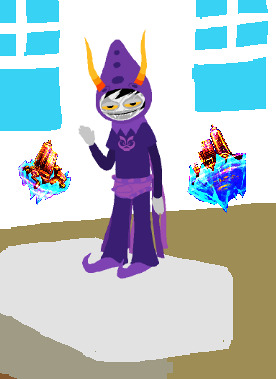
Ah fuck.
Continued in part 2.
#wormblr#wildbow#jack slash#parahumans#metafiction#funny games#michael haneke#anybody home?#michael j seidlinger#mals says#mals reads worm#Youtube
147 notes
·
View notes
Text
Susan Twist: Word Lord?
Many* people** are wondering about the theory held by certain Doctor Who fans*** online that the actress Susan Twist in the new season of the long running franchise is playing what's known as a "Word Lord".
Now, granted, many more are wondering whether she might, in fact, be Susan, the Doctor's granddaughter. That, my friends, is exactly the kind of question a Word Lord would want you to be asking.
Lemme break this theory down for you.
Throughout this whole new season of Doctor Who, the protagonists have been haunted by the recurrence, in different roles, of a stage and character actor who happens to have the delightful name Susan Twist. Like, not in the show, in real life. According to Russel T Davies, she was the only actor they could get due to an "actor shortage", which seems like a pretty terrible and even implausible dilemma, but luckily Davies has made lemonade out of this very real production constraint! Twist popped up in every episode this season, in some form or other. That's versatile writing! No wonder they brought Rusty back as showrunner.
But perhaps there's more to the story than just the unfortunate realities of filming in a country ruled by a failed regime...
The Doctor and his companion Ruby started noticing Twist's recurring roles over the past few episodes, though the plot of each episode intervened before they could put anything definitive together. It's one of a number of nods to the metatextual content of the show--literal winks to the audience, another character (Mrs Flood) directly addressing the viewers, a whole musical number about how there's "always a twist at the end"--that suggested maybe some authorial tomfoolery was afoot, that maybe something a little tricky or tongue in cheek was happening.
But what could the explanation be? Could Susan Twist really be playing THE Susan, a relative of the Doctor's that hasn't been seen in the franchise since the 60s? That seems a little silly, surely! Or could she be playing another character, like... the Rani? or the Monk? Both of them got namedropped alongside Susan at one point. Or maybe she's the portended head of Maestro and the Toymaker's extracosmic family. I guess there's a theory this is Sutekh, the evil alien god from Pyramids of Mars? Sure, seems fun.
But no. Fuck all that noise. I know what's really going on here and it just coincidentally involves a character that I'm feral about, and that no one else has even heard of, a guy called, somewhat fittingly, Nobody No-one.
No-one shows up in just one and a quarter stories by Steven Hall for Big Finish's series of audio dramas, first as a minor opponent (in 45) and then as a much more motivated and fearsome one (in A Death in the Family). In the latter story, he manages to--no points if you worked this out from the title--kill the Seventh Doctor. How did a character with such a low profile manage such a feat? Well, Nobody No-one has powers comparable to a Time Lord: he is a Word Lord.
Word Lords are one of the most delightfully bonkers concepts to come out of the early exciting and experimental period in Big Finish's line of audio dramas. Hailing from another universe, they're the equivalent of Time Lords for a reality where narrative rather than chronology drives all existence. It's like if the Anchoring of the Thread established not linear time but, I guess, TV Tropes instead. Nobody No-one regenerates like the Doctor, and has his own equivalent to the TARDIS: the CORDIS, or Conveyance Of Repeating Dialogue In Space-time, which is a memetic construct transporting the Word Lord through repeated phrases, jokes, coincidental number recurrences, and so on. The CORDIS is heralded by the number 45 popping up, and you'd better believe I sat up and noticed how many times that number recurred in the code pattern in Dot and Bubble! In Death in the Family there's a whole military organization the Doctor's mucking around with--No, not UNIT. No, not Torchwood. A different thing, one run by a human supremacist vampire hold on we're getting off topic--and Nobody casually reveals at one point that his CORDIS was bouncing around inside their "For King And Country" mantra for years.
Nobody No-one's real fun as a villain comes from his special Bullshit Powers. He's a Word Lord, so he's basically a memetic being, right? He IS language in some sense. Like, apparently his CORDIS crashed into the alphabet after his first encounter with the Doctor, annihilating the 27th letter of the alphabet and causing the English Great Vowel Shift. This story does a ton with the concept of "what if a guy was words".
But what makes him so dangerous is a quirk of his own identity. To grasp what a Word Lord can do, you have to think linguistically, dialogically. Imagine someone haplessly says: "but, nobody could have gotten into that locked room to kill the ambassador!" What would that allow a Word Lord to do? And imagine further:
"No-one tells the sun whether or not to shine."
"Nobody could survive that!"
"Nobody could just kill the Doctor!"
One slip of the tongue, that's all it takes for Nobody No-one to gleefully command godlike power.
That's Nobody, though. I don't think Susan Twist is just Nobody. I mean, No-one could seriously ask you to believe that this character who appeared in an (unfairly, given its quality) obscure audio adventure, written by an author who only ever wrote those two stories for Doctor Who, with a bunch of wild over the top and no doubt difficult to write around powers, is going to suddenly come back as a major character in the third tv revival of this 60 year old franchise. Like, Nobody would expect Davies to start referencing, I don't know, the Shalka Doctor either, surely. And I wouldn't ask you to make that kind of totally absurd leap, not even if I happened to be writing some sort of tongue in cheek article.
No, what I'm--I mean, what the fans are suggesting is that this concept of a Time Lord but for stories, who comes from a Borgesian narrative dimension, appearing in one and one quarter obscure audio dramas by an author who never wrote anything else for Doctor Who... what the theory proposes is that there's a SECOND one of those guys.
Just think about it, think about it like a Word Lord. What has the fandom asked itself about this season? Surely, one of the foremost questions is simply: what about Susan, the Doctor's granddaughter? She's been name dropped a few times, the Doctor doesn't say she's definitively dead... could there be some reveal here that Susan is alive? There's got to be, right? That's what they're leading up to!
There's just got to be a Susan Twist.
That, my friends, is exactly how she snuck into this reality.
Now, maybe the "Susan Triad" slated to appear next episode isn't this Word Lord proper but a kind of, I don't know, fictionsuit or vessel or entry point. I'm also not sure what a "Susan Twist" would even want, what the grand scheme would be. Unlike Nobody No-one, there's not a lot of word games you can play with "Susan Twist" beyond the obvious. But, maybe that's part of the point. Nobody No-one was a megalomaniac, a guy who really did just want to watch the world burn. The Doctor's companion Hex accuses him of being "proper mad", and he responds, "Mad? I'm FUUURIOUS!" followed by an explosion from the grenade he had tossed into the duck pond. Nobody is a brash, arrogant, chaotic, and... probably not that bright guy, who has the advantage of his CORDIS's many tricks and his incredibly versatile name. Perhaps this new Word Lord wants something other than chaos and destruction. Maybe she simply wants what we've already seen her achieve in the show: universal ubiquity. There's always a Twist at the end.
Actually, this would weirdly parallel another beat from Death in the Family. In order to trap Nobody, the Doctor weaponizes his own narrative against the Word Lord, tapping into the universal internet and googling himself in order to build a whole proxy universe based on his own life. From another perspective, he basically uses the entire narrative of Doctor Who--all the episodes, all the Big Finish audios, all the Doctor Who Monthly comics, all the Virgin New Adventures--as an ideatic missile. This is such a cool concept I'd feel guilty about giving it away, only it happens about a fifth of the way through Death in the Family. Seriously, this audio GOES places. Anyway, the suggestion is that the Doctor is so entangled with the history of the universe, so threaded throughout all these other narratives, that his history effectively is a world unto itself that a being of narrative like Nobody might get completely lost in.
That's a kind of narrative ubiquity if there ever was one. If I was a Word Lord I'd be sorely tempted by that. Nobody is: he appears a perverse counterpart to the Doctor (and personally I think David Tennant would do a GREAT job playing him if he ever appeared in the show). I can't help but notice, incidentally, that we just got an episode where the shapeshifting Chuldur quickly became obsessed with cosplaying as the Doctor, and Wild Blue Yonder also introduced a couple of not-things trying to copy him. Could this Word Lord be seeking to build a narrative as strong and inescapable as the Doctor's?
It would be an interesting way of incorporating some of these meta elements without slipping too far into a kind of self-referential morass. It feels like Davies has been dancing right up on that line this entire season in a way that's exhilarating, but that also has been a bit nerve wracking for me. The more metatextual storytelling has exited the realm of weird independent art and entered the mainstream, the more cloying it's started to feel. Like, when you engage the audience, entreat them directly to care about the characters or write tearful paeans to the necessity of the Hero as a Symbol, the more it can start to feel like a bit of a desperate exercise in brand management. Clap if you DO believe in fairies, and all that. Doctor Who certainly has some history of guilt here--sorry, Steven Moffat, but sometimes it does get to be a bit much. And it does risk standing the purpose of literature on its head, where ironically through characters lauding the virtues of storytelling within society, the virtue of having participated in a transaction consuming art becomes the foundation of fandom, and the actual literary content is assumed, but treated as an afterthought.
Davies has thus far instead treated the meta content in two ways: as a unique physics to be solved, and as a way of exploring a particular bit of social commentary (sometimes more than one at once). Goblins use a "language of luck" and a physics of rope and knots, the Toymaker brings the world into a State of Play, and Maestro introduces a State of Musicals. To challenge these beings, the Doctor must understand their particular ontology and exploit it. As soon as the Bogeyman in Space Babies faces real peril, all the children who were afraid of it rally to its defense, which doubles as both a commentary on the "Teatime Terror for Tots" charge thrown at children's media like Doctor Who--children LIKE scary stories and creepy, gross monsters!--and reinforces Davies's acidic anger at social and political abandonment of people who are inconvenient to the bottom line. Rogue plays gleefully with fanfiction tropes, and its positioning of the Chuldur as "cosplayers" would riiight up to the edge of being a little too navel gazing about toxic fans... if not for the fact that the Doctor and Ruby are also explicitly cosplaying as Bridgerton characters, and the episode is still giving fans exactly what they want in the form of a whirlwind gay Doctor/Rogue romance. This season is concerned with these sorts of metatextual games, without being subsumed by them and becoming entirely about self-referential brand building.
A Death in the Family is also, notably, only partly about Nobody No-one and his machinations and the counter-machinations required to stop him, set into motion by the Seventh Doctor and carried out beyond his death by companions Ace and Hex. Like I said, a lot of the seismic action of the story is over within the first 25 minutes. The Word Lord is really just used as a jumping off point to talk about a bunch of other stuff: truth, lies, choices made for ourselves or made for us by others... we see multiple information-worlds built in the story, some of them more subtle than others. At one point Ace tearfully proclaims that traveling on the TARDIS with the Doctor "is the only life I've ever wanted!" The Seventh Doctor retorts, with some audible guilt and distress, "No, it's the only life you've ever HAD!" In a very real sense, the Doctor has created the notional worlds that Ace and Hex inhabit, defining the contours of Ace's life since she was a teenager, and deliberately staying silent about Hex's traumatic family history, deciding for both of them "what's best". Nobody No-one in that sense is a pretext, in the best tradition of Doctor Who, to dig into questions about power.
The metafictional is risky, but it's a narrative tool like any other, and it fits with a long history of Doctor Who as a franchise reflecting on itself and its place in culture, with everything from the Mind Robber's suggestion that the Doctor himself might be an escapee from fiction, to Vengeance on Varos and Trial of a Time Lord's dramatization of Doctor Who's conservative culture war critics, to the Last Great Time War as metaphor for the show's cancellation. In a sense, behaving as though cosplay or fandom or whatever don't exist and couldn't possibly be the idiom through which characters--even weird alien characters--interpret their reality and act upon it might equally alienate the show from being about any wider culture beyond itself, endlessly, the same dalek and cybermen and Master stories recycling forever. My hope is just that as Davies barrels into the finale at full speed, it's this sense of a meaning for Doctor Who beyond its own lore driving him. The anger we've seen from him about social issues, the commitment to changing the show where it needs to grow, and the willingness to take big swings at continuity all give me some reason to feel confident.
Confident, of course, that he has seen the wisdom and logic of building his arc around Susan Twist being a Word Lord. What? That's what this article is about, remember? That didn't stop being a thing. Anyway, I'm excited for friday, when all of us pulling for this theory will be proven indisputably right, and you will all, in deference, subscribe to my Patreon.
* alleged
** hypothetical
*** me, specifically
65 notes
·
View notes
Note
Are you aware of any fics in which Neil Gaiman and/or Terry Pratchett are actually God? Or fics in which Azirpahale or Crowley meet Terry or Neil?
I can only find a few, a couple of which can already be found on our #metafiction tag...
Air Conditioning meets Neil Straightman. What happens next is shocking! by SillySlvt (G)
When Aziraphale and Crowley were summoned to the heavens, they didn’t know what to expect.
A sixty three year old man was not what they were expecting.
Or: Aziraphale and Crowley meet their TRUE creator.
How Neil Got Lost in a Good Book by siephilde42 (G)
An author falls into a reality where his book, or more precisely, the TV adaptation of his book, is real. Witnessing the onset of the apocalypse is stressful, even if you know how it is supposed to end.
The Nice and Accurate Prophecy of Neil Gaiman by oneofmyalters (T)
A day in the 1980's, probably a month of good weather.
Neil Gaiman, a brilliant youngman at the verge of doing great things (as he always has been), is sitting over his writing desk, nothing but a plain wood table, a lamp and some pens and paper staring back at him. His eyes are lost in wonder, for his mind is plotting. Having fed it just with the right amount of fantasy from watching his favorite movies, having some nice conversations and meeting the right people, he is now ready to throw up. You can see the word vomit forming at the back of his neck, climbing upwards with the strength of thunder.
His brain is ready to send the message to his arm, right hand and fingers.
And once he does it, the words will flood...
- It did not happen that way.
- I thought I could put a nice spin to it. Make it sparkly with the magic of writing...
- That would be lying to our readers.
- This is fiction. Writers do that all the time.
- You could say the same about lying.
- Then, how DID it happen, Crowley?
- Write it down, Angel.
Lit by fellshish (T)
Crowley takes a university course on literature and surprise! The book they’re discussing is Good Omens. Uh oh.
- Mod D
57 notes
·
View notes
Text
I love GO from a statistical perspective
Stupid title I know but bear with me.
In statistics, a correlation is only valid over the original domain of the sample data. Okay?
So if I collect data from 1990 to 2010, anything I infer from that is valid from 1990 to 2010. It has limited and diminishing applicability the further I get from those limits.
GOOD OMENS begins before the beginning. I have a hunch that it continues after the end. Our domain is not just "all real numbers." It is also imaginary numbers.
Literally everything is subject to the correlation. Which means that there is no fanfiction too far-fetched.
You wanna write Star Trek AU ineffable husbands? It finds a basis in canon. There are aliens.
You wanna write deep sea AU ineffable husbands? It finds a basis in canon. Aziraphale is a dolphin that thinks he's a fish.
You wanna genderbend the ineffable spouses? Canon beat you to it, they were already all of the genders and a blank slate. Go nuts.
Nothing is so far from canon that it cannot stroke its chest and ask for sherry, large please.
fuckin love this shit
123 notes
·
View notes
Text
God Is a Creepy-Ass Meta Mfer:
A Good Omens Essay
This essay features fan theory and speculation. DO NOT TAG NEIL GAIMAN IN ANY POST THAT INCLUDES OR REFERENCES THIS ONE.
The rest of this depends on accepting the premise that God's Plan is not always inscrutable in hindsight, i.e., that parts of that Plan can be discerned or identified as such once they have happened, even if the next moves of the Plan and its ultimate Purpose remain ineffable.
If you are willing to accept that premise, then I suggest we can conclude with reasonable certainty that Thesis Statement 1: Aziraphale's act of giving Adam the First Man the flaming sword is part of God's Plan, and so was Eve and Adam eating the Fruit.
The argument for the latter has been in circulation making even the beardiest of old Christian men scratch their heads for centuries, and in Good Omens, Crowley is the first being ever to make it:
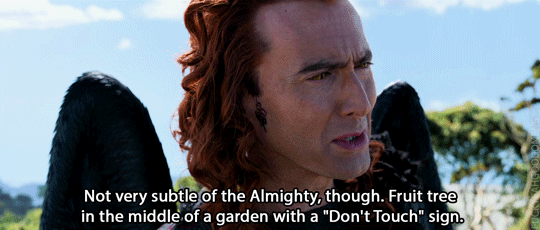
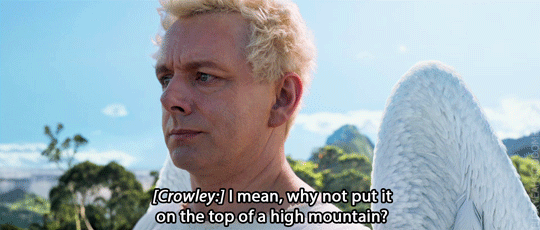
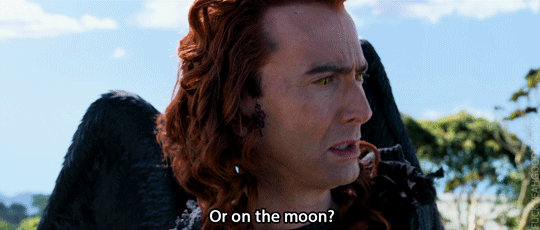
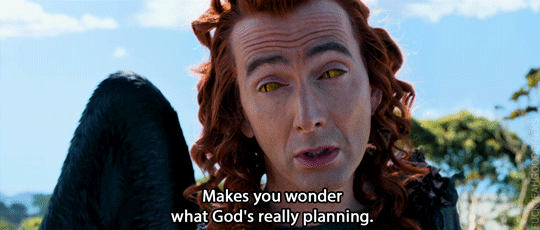
The presence of the Tree in the Garden placed by an omnipotent being with literally infinite orchard space and security technology is a clear indication that God intends humans to interact with the Tree and sets humans up in a divine entrapment operation, giving God the opportunity to curse humanity and evict them from the Garden.
Diversion onto Thesis Statement 2 bc the Essayist Got Distracted: This establishes both the Bible and Good Omens as works of literature in the cosmic horror genre (not that Good Omens doesn't do plenty of its own work in so establishing itself).
In both these stories God is a being beyond humanity's understanding, functionally omniscient and omnipotent, who first creates and then interferes with humanity for unknown reasons and who does not necessarily have humanity's best interests in mind at any point. His/er reasoning and objectives for humanity are opaque, and S/he manipulates circumstances to create excuses to do humanity as a species and sometimes specific humans harm.
If you're not already familiar, go read all the shit God curses humans with when Eve and Adam snack on the Tree's Fruit. It's frighteningly cruel, if not outright psychopathic. So is God's behavior the Book of Job, His demand that Abraham sacrifice Isaac, Mosaic Law, and the sacrifice of His/er Son. Human lives are no more significant to God than the lives of ants are to humans. This whole history of Earth? It may not even be about us. Our entire species' history may just be part of the backdrop to something else, like two angels falling in love and reuniting Heaven and Hell, or like raccoons. It could all be about the raccoons. Who knows! All of this is absolutely 100% pure undiluted cosmic horror.
Right, okay, so back to Thesis 1: In Good Omens, Aziraphale's gift to the first man of the flaming sword is an objective God wants. Here's my chain of reasoning:
The Eating of the Fruit and God's punishment were both objectives of God. See above.
2. Once those objectives had been accomplished, humankind would not have survived outside the Garden of Eden without the sword. They literally would not exist at all.


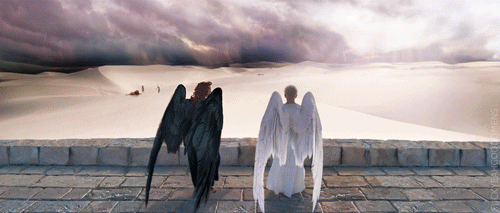
Adam the First has to kill the lion, either to keep it from killing him and Eve or to keep him and Eve from starving. No flaming sword = no humanity.
3. We know "no humanity" is not God's Plan, because--
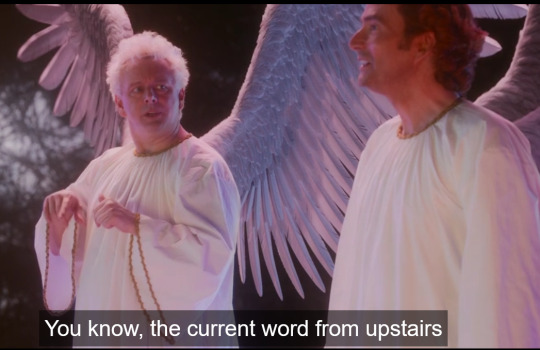
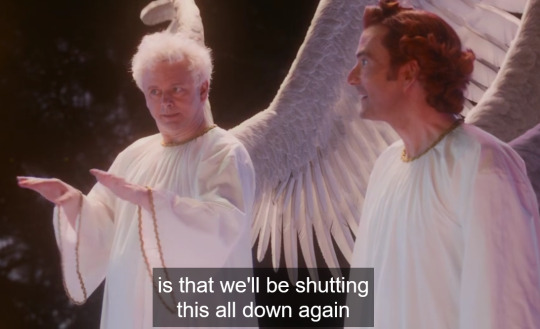
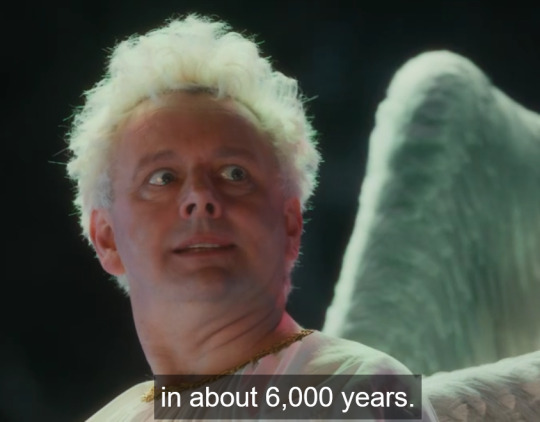
--God says her Plan is Armageddon and the Second Coming in 6,000 years. So humanity needs to exist for either of those to occur (or for there to be any reason for adventures about averting them to occur). And God does a whole Crucifixion and Resurrection of His/er Son. So God wants humanity around and is even prepared to welcome them back into His/er grace, providing they meet certain conditions.
4. We know God is not displeased about Aziraphale's gift of the sword to humans because God asks Aziraphale about the sword, and Aziraphale lies and says he's lost it, and God, who is omniscient and therefore knows this to be a lie and knows exactly where the sword is, lets the entire thing pass unremarked. (More on this anon.)
5. It is not a reach too far to suspect this of God. She tells us Herself that she is a trickster and that we can't trust her not to deceive us:
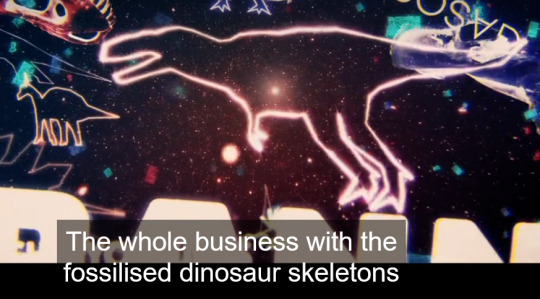

She also tells us
i. The universe is a game she is playing for her own amusement:
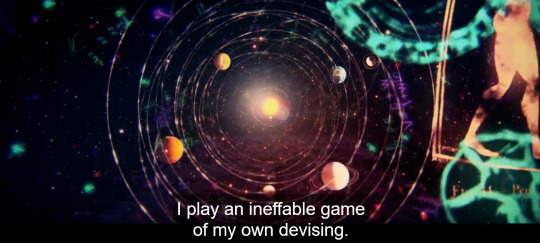
🎵cosmic horror alerrrrrrrrrt!🎵🎶
ii. No one, including angels and demons, has been told the real rules of this game:

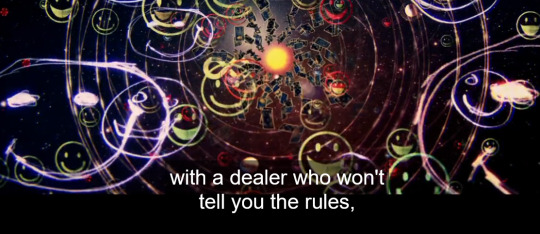
"FOR EVERYONE ELSE." Not just humans.
That's why Crowley and Aziraphale each have to wonder if they've done the right or the wrong thing: nobody's told them what the rules are. Aziraphale even thinks that Crowley's temptation of Eve is "all part of the Plan," i.e, that Crowley did the right thing by doing the wrong one. They have no way to tell, and it may be both right and wrong at the same time. (Wrestling with impossible moral conundra raised by a brief look into a story happening on a much greater level than your own? You could be suffering from our old pal Thesis 2: Good Omens is cosmic horror!)
So Aziraphale's Promethean gift to humanity was one of God's objectives, just as cursing humans and yeeting them out of the Garden with the knowledge of Good and Evil and maybe a couple apple seeds in hand was His/er objective.
BONUS! Thesis 3: So why does God bring up Aziraphale's misappropriation of the sword at all? To show us, the audience, that Aziraphale lied to Her and that his gifting of the sword to Adam is part of Her Plan.
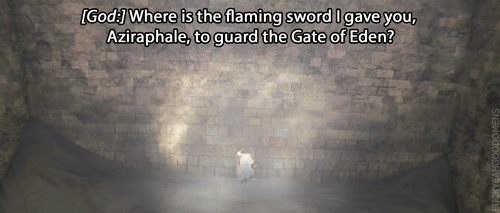
Remember from her whole deal with the Tree: God likes to set up situations so that She can react to them. Here she lampshades her awareness of what Aziraphale has done, listens to him lie to Her about it, and then very pointedly does nothing in response to that. She wants everyone watching--i.e., Aziraphale and us--to note that she has noticed the transfer of the sword and is not displeased by it and has noticed the lie and is not going to do anything about that either.
Remember as well, God is the one controlling the narrative we see in S1 of Good Omens. She introduces and concludes the story, and she narrates the scenes of the baby-swap. She's in control of which scenes we see and the order in which we see them. Since she is the one who asked Aziraphale the question about the sword, she's also responsible for this scene's existence.
So why do I think this scene is meant for us and not Aziraphale? Two reasons. Firstly, the conversation with God doesn't do Aziraphale any good. He worries about eventually getting in trouble about the sword until 2019, around 6,000 years later.
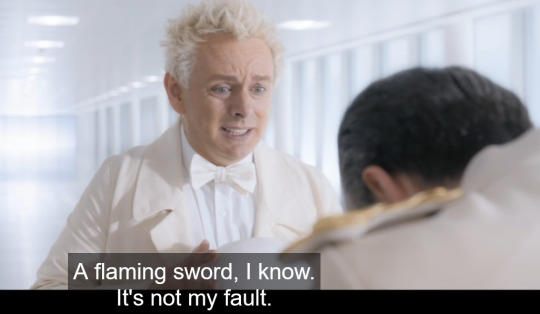
God is both omniscient and omnipotent, so it's not possible that She failed to communicate to Aziraphale in such a way that would ease his anxiety. Therefore the conversation was not for his benefit. Again, she's omniscient, so it wasn't for Her benefit either. That leaves the only other party to this conversation: us. The audience.

The next obvious question is, Why does God want us to know that Aziraphale's gift of the flaming sword was both of his free will and part of Her Plan?
I don't know. But I think it may become important, and here is where we delve into hypothesis territory: I think Good Omens is going metafictional. I mean this in a Doki Doki Literature Club, Black Mirror: Bandersnatch way: God, the character in Good Omens, is telling us, the audience, a story.
This metafictional aspect has been with us the whole time---more precisely since 01:13 of S1E1, when God switches from third-person to first-person and addresses us the viewers directly:

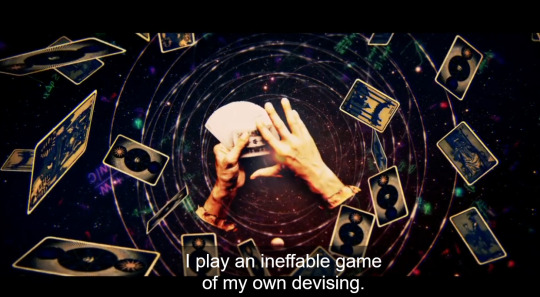
And there are several more metafictional; notes in S1 and S2 that I've found so far:
Season 1
That giant eyeball up there floating in space with a bunch of arcane shit around it is a reference to the opening credits sequence of The Twilight Zone, a metafictional show in which an omniscient narrator introduces and concludes each story by addressing the audience directly.
S1E1 27:20
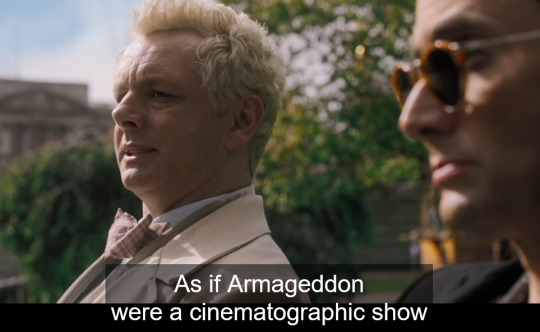
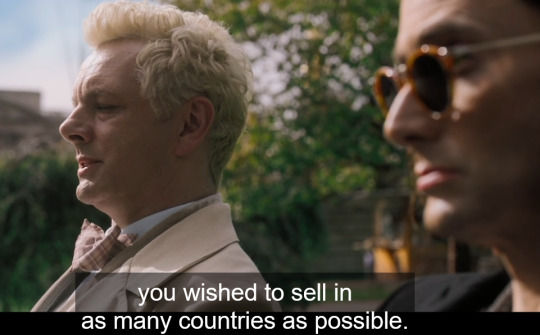
Season 2
1. Maggie and Nina are fictional characters, but the characters share their names with actors Maggie Service and Nina Sosanya.
2. The final credits sequence, with the split screen showing Crowley on one side and Aziraphale on the other, references David Tennant and Michael Sheen's previous/simultaneous lockdown tv series project, Staged! which is intensely metafictional and in which Tennant and Sheen play characters based on themselves and with their names.
3. Sloppy plot synopsis or something more sinister?
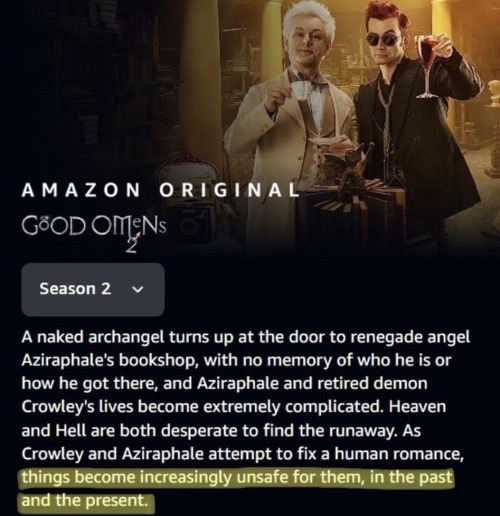
4. An interviewer points out that Good Omens references Doctor Who as an extant concern in-universe, which obviously stars David Tennant in the past and currently.
If you find more, please drop them in the comments!
We the audience, are meant to understand ourselves and our reality as being indirectly involved in this story. And God wants us to know 1) that Aziraphale lied to Her about giving away the sword, knowing it was futile, and 2) that his gift of the flaming sword was part of Her Plan. The former is a major character note, and probably a foreshadowing one; but I have no guesses about God's purpose in showing us that the gift of the flaming sword was also to Plan except that whatever it is will probably make me dislike Her approach to parenting even more than I already do.
What I do love about this though is that it suggests that Crowley and Aziraphale both did the right thing by doing the wrong one, i.e. achieved a kind of Schroedinger's obedience, which is nice and disturbing and surprise! pretty cosmic horror. More sweetly, though, it suggests that the two foundational gifts to humanity from the divine were motivated by Crowley's low-effort mischief and Aziraphale's kindheartedness, which is lovely to think about.
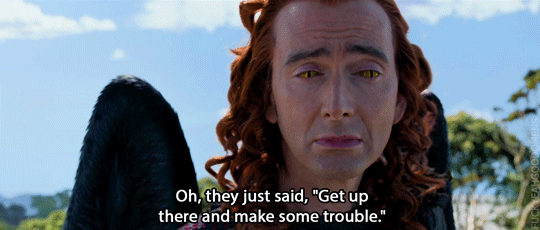
DO NOT TAG NEIL GAIMAN IN ANY POST THAT INCLUDES OR REFERENCES THIS ESSAY.
#good omens#good omens s2#good omens god#good omens metafiction#good omens cosmic horror#good omens flaming sword
186 notes
·
View notes